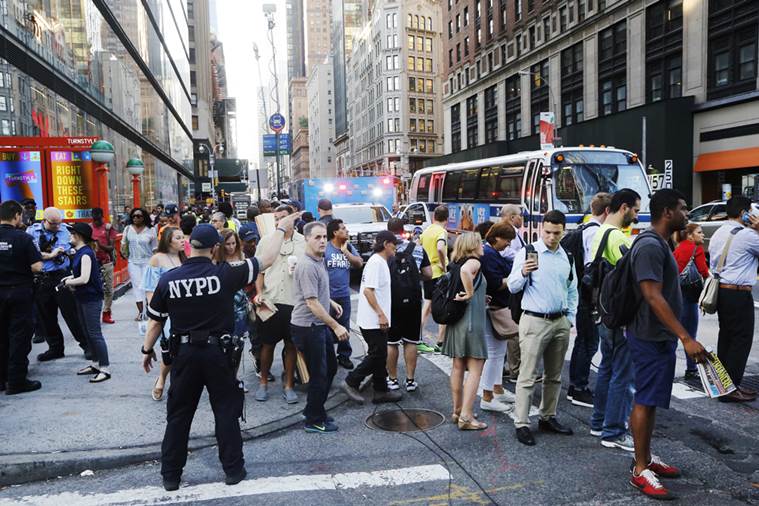U.S. investigators on Sunday were studying possible links between a pair of bombs detonated in New York City and New Jersey over the weekend, although no evidence had yet emerged tying the devices to known extremist groups.
The country was shaken by a trio of attacks over the weekend including a Saturday night bombing that injured 29 in Manhattan and a stabbing attack at a Minnesota shopping mall that wounded nine.
While officials described all three as deliberate, criminal acts and were investigating them as potential “acts of terrorism,” they stopped short of characterizing the motivation behind any of them until more evidence is uncovered.
A deafening roar and powerful shock rocked Manhattan’s popular Chelsea neighborhood late on Saturday after a pressure-cooker bomb packed with shrapnel exploded. A similar, unexploded device, was found a few blocks away later that night.
No international militant group immediately claimed responsibility for the New York blast or a pipe bomb that went off earlier along the route of a Saturday road race in suburban New Jersey. But New York Governor Andrew Cuomo said the act of blowing up a bomb in a crowded area of Manhattan “is obviously an act of terrorism.”
No suspects were immediately identified in the New York and New Jersey attacks.
But CNN reported on Sunday night that police had reviewed surveillance video showing a man, who was not identified, leaving both devices on Saturday.
The Islamic State militant group quickly claimed responsibility for the Minnesota attack by a man who made references to Allah and asked at least one person if he or she was Muslim before he assaulted the individual. An off-duty police officer fatally shot the assailant.
Police did not immediately identify the Minnesota attacker, citing an ongoing investigation, although some local media reports gave his name and said he was an African-born junior college student. Reuters could not immediately confirm his identity.
There were no immediate connections established between the Minnesota attack and the bombings in New York and New Jersey, which came days before the United Nations General Assembly opens on Tuesday. Some 135 heads of state or government are expected to attend the event, and city officials said they had bolstered an already heavy security force with 1,000 more uniformed police officers and National Guard members.
‘CRUDE’ DEVICES
Federal Bureau of Investigation experts were examining remnants of the two devices that went off in Chelsea and Seaside Park, New Jersey, some 80 miles (130 km) south of New York City, as well as the undetonated pressure-cooker bomb, the same sort of improvised explosive device that killed three people and wounded more than 260 in the 2013 Boston Marathon bombing.
“The crudity of the devices in all three cases certainly doesn’t point to any group that’s been developing (improvised explosive devices) for years,” said a U.S. official involved in the investigation who requested anonymity to discuss the inquiry.
The official added that the crude nature of the devices and the apparent low level of planning had some investigators concerned that the blasts were just a test of New York’s security.
“That’s what worries us: Was this some kind of test run, not just of the devices, but also of the surveillance in New York and the response?” the official said.
The United States has experienced a series of deadly attacks over the past year by gunmen inspired by Islamic State, which has been fighting a long civil war in Syria. A man who claimed allegiance to the group fatally shot 50 people at an Orlando, Florida, nightclub in June, six months after a married couple massacred 14 in San Bernardino, California.
Investigators at the FBI’s lab in Quantico, Virginia, were set to look to see if the three devices in the New York area had a common design, although a U.S. official familiar with the inquiry said that would not be proof in itself the attacks were linked.
“Almost anybody could have fabricated these bombs and used cellphones as timed detonators,” said the official. “There are instructions all over the internet, and the crudity, positioning, and relative ineffectiveness of these does not suggest that a more sophisticated group played any role in this.”
The bombs used in the Boston Marathon bombing were built using instructions that the pair of brothers behind the attack found in al Qaeda’s “Inspire” online magazine.
The FBI considers the Minnesota episode a “potential act of terrorism,” Richard Thornton, FBI special agent in charge of the agency’s Minneapolis division, told a news conference on Sunday.
Amaq, the news agency affiliated with Islamic State, issued a statement on Sunday calling the attacker “a soldier of the Islamic State.”
Reporters was not immediately able to verify the Amaq assertion.
(Additional reporting by Mark Hosenball and John Walcott in Washington, Robert MacMillan in New York and Alex Dobuzinskis in Los Angeles; Writing by Scott Malone; Editing by Peter Cooney)


 Billionaire Watch3 weeks ago
Billionaire Watch3 weeks ago
 Startups4 weeks ago
Startups4 weeks ago
 News4 weeks ago
News4 weeks ago
 News4 weeks ago
News4 weeks ago
 Bitcoin4 weeks ago
Bitcoin4 weeks ago
 Naira4 weeks ago
Naira4 weeks ago
 Forex3 weeks ago
Forex3 weeks ago
 Treasury Bills4 weeks ago
Treasury Bills4 weeks ago


























